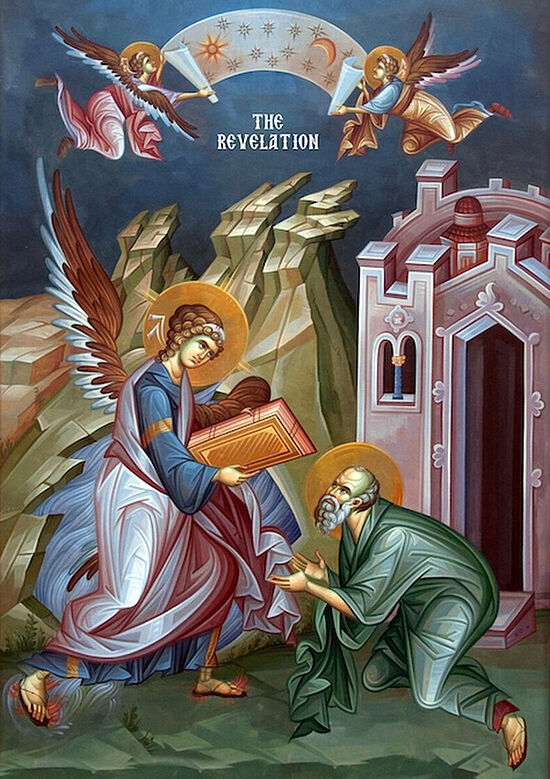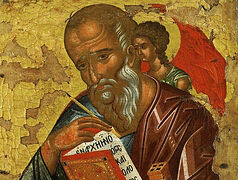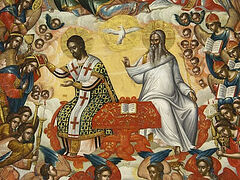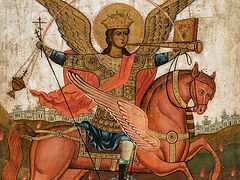Today we are looking at the words that praise the book of Revelation:
Blessed is he that readeth, and they that hear the words of this prophecy, and keep those things which are written therein: for the time is at hand (Rev. 1:3).
From the very beginning of Revelation, the Lord Himself calls Christians to read it. In no other book of the Bible do we find such a promise for those who read and hear it. God Himself calls us to study Revelation!
Blessedness is promised not simply for reading, but for observing what is written. Fulfilling the word of God is the key to unlocking our understanding of the book of Revelation. The heartfelt desire to fulfill the commandments of Christ is the door through which a Christian can enter into the mysteriological meaning of this book.
This is not the place for simply satisfying our own curiosity. We’re not simply deepening our knowledge of Christianity by reading Revelation. We are preparing ourselves to observe what is written, to put into practice the principles we have learned, and realize them in our personal spiritual life.
***
Blessed is he that readeth, and they that hear.
“Blessed” in Greek is μακαριος (makarios). Therefore, in Biblical studies, such “beatitudes” are called “makarisms.”
In ancient Greek literature, the word μακαριος is used to refer to the Heavenly bliss of gods and men. “Makarios” is he who has perfect happiness, without any admixture of earthly sorrows.
In the Septuagint, the Greek term μακαριος is used to translate the ancient Hebrew word אשר (“asher”—happiness, blessedness). “By ‘blessed,’ if we take into account the meaning of the Greek and Hebrew words, we can refer to people who are prepared for eternal salvation and beatitude. They possess inner virtues, and inner peace and happiness even now, here on earth” (Lopukhin’s Study Bible).
In the Christian understanding, blessedness is the perfect state of spiritual joy, a consequence of union with God as the genuine Good. This joy is hidden, serene, and very personal, and unaffected by the vicissitudes of life. This joy even permeates us through suffering. Neither sorrow, nor loss, nor pain can destroy it. Joy in Christ shines through our tears, and neither life nor death can take it away.
“This is not the noisy, superficial happiness that comes and goes twenty times a day, so fragile and impermanent. It is a deep happiness that comes not from one cause in particular, but because our soul, in the words of Dostoyevsky, has touched the ‘other world.’ And it touched something full of light, peace, joy, and inexpressible hope,” writes Archpriest Alexander Schmemann.
We also find the promise of blessedness for this or that virtue in the Old Testament. For example: Behold, blessed is the man whom God correcteth: therefore despise not thou the chastening of the Almighty (Job 5:17); Blessed is the man who walks not in the counsel of the wicked (Ps. 1:1); Blessed is he whose transgression is forgiven, whose sin is covered. Blessed is the man unto whom the Lord imputeth not iniquity, and in whose spirit there is no guile (Ps. 31:1, 2); Blessed is the nation whose God is the Lord (Ps. 32:12); O taste and see that the Lord is good: blessed is the man that trusteth in Him (Ps. 33:9); Blessed is that man that maketh the Lord his trust, and respecteth not the proud, nor such as turn aside to lies (Ps. 39:5); Blessed is he that considereth the poor: the Lord will deliver him in time of trouble (Ps. 40:2).
In the New Testament, the teaching of blessedness is expressed in Christ’s Sermon on the Mount: Blessed are the poor in spirit: for theirs is the Kingdom of Heaven. Blessed are they that mourn: for they shall be comforted. Blessed are the meek: for they shall inherit the earth (Mt. 5:3-5).
***
We have before us the first of the seven “makarisms” in Revelation. Let’s name the seven:
1. Rev. 1:3 Blessed is he that readeth, and they that hear the words of this prophecy, and keep those things which are written therein: for the time is at hand.
2. Rev. 14:13 And I heard a voice from Heaven saying unto me, Write, Blessed are the dead which die in the Lord from henceforth: Yea, saith the Spirit, that they may rest from their labours; and their works do follow them.
3. Rev. 16:15 Behold, I come as a thief. Blessed is he that watcheth, and keepeth his garments, lest he walk naked, and they see his shame.
4. Rev. 19:9 And he saith unto me, Write, Blessed are they which are called unto the marriage supper of the Lamb. And he saith unto me, These are the true sayings of God.
5. Rev. 20:6 Blessed and holy is he that hath part in the first resurrection: on such the second death hath no power, but they shall be priests of God and of Christ, and shall reign with Him a thousand years.
6. Rev. 22:7 Behold, I come quickly: blessed is he that keepeth the sayings of the prophecy of this book.
7. Rev. 22:14 Blessed are they that do His commandments, that they may have right to the tree of life, and may enter in through the gates into the city.
Three times, keeping the commandments is mentioned. This is of utmost importance to the Lord. More precisely, it’s the most important thing for us if we want to be saved and enter into His Heavenly Kingdom.
There are seven “makarisms” altogether. Seven is a symbolic number. The book of Revelation has several seven-day cycles. We will talk about the numerical symbolism of Revelation a bit later.
The whole book is framed by two “beatitudes.” In the beginning: Blessed is he that readeth, and they that hear the words of this prophecy, and keep those things which are written therein: for the time is at hand (Rev. 1:3). And at the end of the book it says: Behold, I come quickly: blessed is he that keepeth the sayings of the prophecy of this book (Rev. 22:7).
Let us recall the chiastic composition—the cyclical nature of the narrative with certain conceptual centers. This “arc” of the beatitudes underlines the prophetic significance of the book and the vital task it sets before Christians.
***
For the time is at hand.
This translation is not quite accurate. It would be better translated as “the term is near.” It’s not a question of “time,” but of a God-appointed, perfectly defined “term.” It is the term of the coming of the things which must shortly come to pass (Rev. 1:1).
The eschatological events of the end and the day of salvation are close in time and spiritually. “It’s later than you think,” said Fr. Seraphim (Rose).
***
Then comes the usual greeting for the Apostolic epistles. The apostle John presents himself as the author of the book and sends his addressees the blessing of Christ: John to the seven churches which are in Asia: Grace be unto you, and peace, from him which is, and which was, and which is to come… (Rev. 1:4).
But we will talk about this in the next article.





